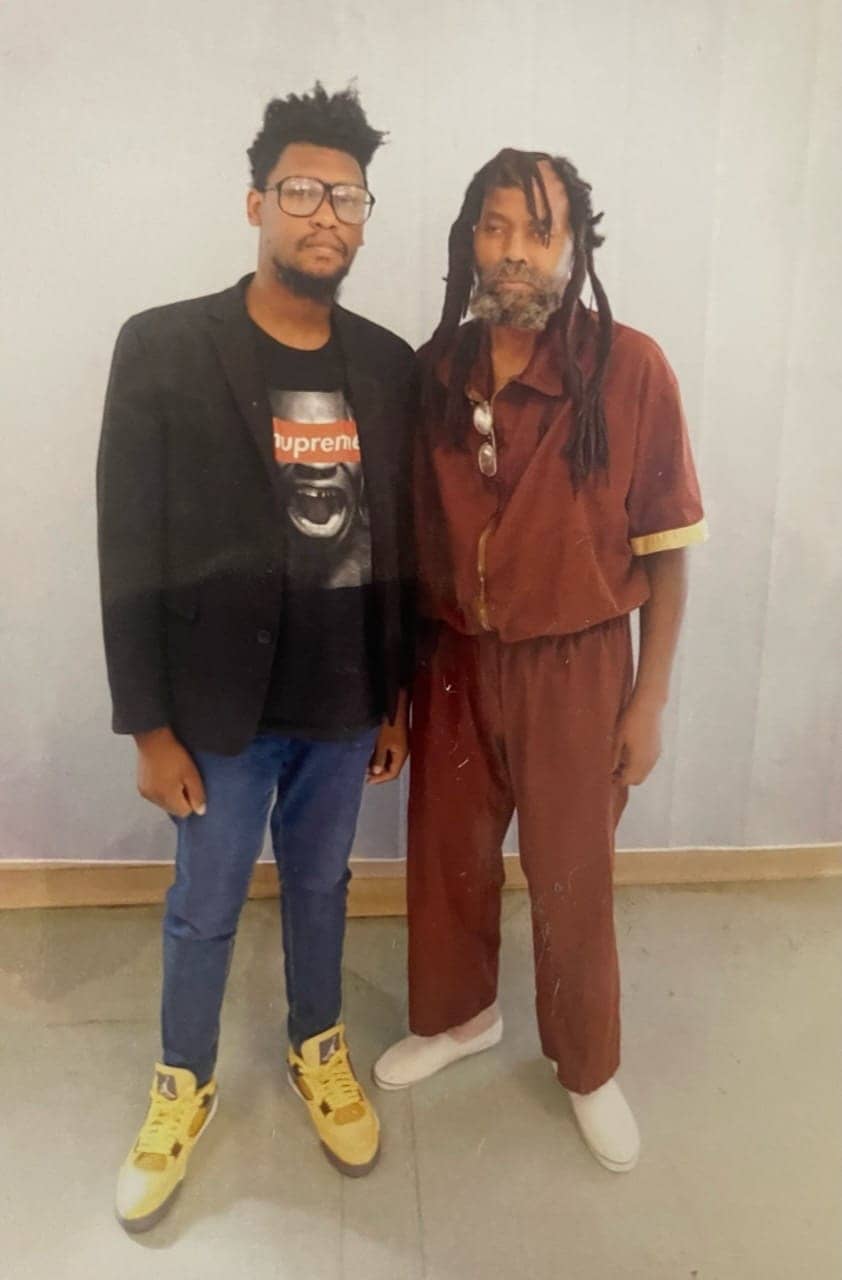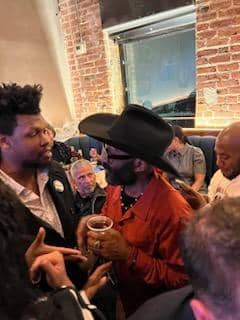
By People’s Minister of Information JR Valrey, Oakland Bureau Chief
JR Valrey: What prompted you to start the Love Not Phear campaign? Why did you pick that name and what does it mean?
Jamal Hart: Love Not Phear is more of a strategy, an initiative to adopt in unison, than it is yet another Mumia campaign. There are already about a dozen or more campaigns all over the world in my grandfather’s name. There’s no need to add more campaigns, in my opinion.
The Love Not Phear strategy seeks to hone in all of the support into something tangible that can actually turn the keys on Mumia’s cell and get him home. Love Not Phear was created at a retreat alongside activists that have intimate knowledge of what it takes to bring political prisoners home. Love Not Phear was created on the heels of the Move 9 being released.
Love Not Phear was created because we understand that the strategy to bring political prisoners home has changed in the last 40 years and innovative approaches are of the utmost importance. Political pressure is imperative, public perception is important and we are all stronger together rather than apart.
As far as the name goes, Love Not Phear was chosen because of the message: Use love to empower community in challenging state fear. State oppression is rooted in colonialism, capitalism and ultimately a fear that the state seeks to instill in the marginalized and most oppressed members of society. Incarcerated individuals are at the most niched areas of this marginalization.
As the revolutionary Che Guevara stated, “The true revolutionary is guided by love.” Love Not Phear implements this concept by realizing that challenging the state, in love, means having a solid unified strategy and that love can guide us to our most revolutionary selves. The “PH” on “Phear” is an ode to Philadelphia, reminding everyone that although Love Not Phear is an international movement strategy, Philadelphia is ground zero for Mumia’s freedom mission as this was the place of his arrest, and his current incarceration is in Pennsylvania. All pressure should be channeled there for Mumia’s freedom.
JR Valrey: How often do you talk to Mumia? And what do y’all talk about when y’all connect?
Jamal Hart: I don’t talk on the phone with my grandfather often. I only talk to him over the phone or through email when it’s an emergency. I understand that all of the phone lines have additional ears. Every letter, every email, has additional eyes. When I talk to my grandfather, I prefer to talk to him in person. I do so often, four to five visits a month.

I am working as a paralegal for him and my work involves being with him for three or four hours, taking notes, going over movement and legal work. In addition to this critical work, I’m checking on his health. We talk about everything under the sun. This is the time that I connect with my grandfather as much as the revolutionary. We talk about things a grandfather would talk to a grandson about, as well as things that he would talk to a revolutionary about.
If I had to map out what a visit looks like. I’d say we bond, debate and laugh half of a visit. Then after, we get down to the nuts and bolts. We talk about his freedom mission, his battle to get health care and things that we are working on. He provides an extensive analysis on everything based on his wealth of knowledge and study.
So many people want Mumia to do things for them. He does them because he’s of service to the movement. That’s just who he is; he’s very humble and filled with integrity. That kind of dedication requires us to be of service to him. We must remind ourselves of his needs, and his primary need is freedom.
JR Valrey: For people who only know him through journalism, what is his personality like?
Jamal Hart: Mumia is a very humble and thoughtful man. When he’s on a roll, he’s hilarious. And when you get through his dad jokes, you’d get some comedy gems. He’s a jokester and an oracle at the same time. He constantly switches back and forth between historian, comic and teacher.
Mumia’s imprisonment is tied to the deep spite and vendetta Pennsylvania has against him.
My grandfather has a wealth of personality and he always comments on how we are a part of the “egghead tribe.” It figures that we are more alike than unalike and our debates can carry on for well over an hour without either of us realizing the time.
JR Valrey: What makes Mumia Abu-Jamal’s journalism so poignant? Why is he so heralded?
Jamal Hart: Mumia is heralded because he embraces the responsibility of using his platform to educate and empower the people. He’s very aware of struggles, and as he endures his wrongful imprisonment, he’s made it a point to pour his heart into his journalism.
Mumia’s journalism shines a light to provide insight on state repression. I think many people experience Mumia and remember that he himself has been stuck behind enemy lines for over 40 years. This reminds people that there is still a major fight to be had. We aren’t free until he’s free, and while incarcerated, he’s deserving of a tremendous amount of respect. Mumia is reporting from the equivalent to Hell in the United States of America. He’s the lighthouse keeper; he guides us through the darkness.
While most of you know him from his journalism, you should also know about his life while imprisoned. In 2017 he was hospitalized and denied lifesaving treatment, the cure for Hep C. He sued and won that treatment in Abu-Jamal v. Wetzel. This lawsuit opened the door for thousands of people in prison to get lifesaving treatment that they had previously been denied.
This is why Mumia is so heralded. He’s a legitimate man of the people. There’s a saying about meeting your heroes only to find disappointment. Mumia doesn’t disappoint. He’s larger than life while being humble and wise.
JR Valrey: Most recently, we witnessed the release of political prisoner Mutulu Shakur, and within recent years we saw Herman Bell, Jalil Muntaqim and the MOVE 9 released. What is stopping them from releasing Mumia after 42 years?
Jamal Hart: Mumia’s imprisonment is tied to the deep spite and vendetta Pennsylvania has against him. Philadelphia is a stronghold for the Fraternal Order of Police and has deep racist roots. After decades of politicians using Mumia as a political lightning rod, it seems that the state’s adamant on having him die in prison rather than admitting judicial bias and injustices in his case.
We have to work double-time to Free Mumia Abu-Jamal.
I’m very happy to see political prisoners come home. The call everyday is to Free ’Em All. We have to work double-time to Free Mumia Abu-Jamal. In a post-George Floyd world, where Mumia himself is a victim of police brutality, it’s upsetting that Mumia cannot find reprieve. Mumia is 68 years old and he has a slew of health concerns. The other side wants him to die in prison – death by incarceration – and they intend to drag out court proceedings to carry out that sentence. We have to be all-hands-on deck to influence his release.
JR Valrey: What is the most glaring piece of evidence proving Mumia’s innocence in his case in your opinion?
Jamal Hart: There are many pieces of evidence indicating his innocence. If we were to focus on one, it would be the obvious witness tampering. The prosecution’s star eyewitness, Robert Chobert, asked then District Attorney McGill, “Where is the money that is owed to me?” For reference, this note was buried by the prosecution for 40 years and wasn’t previously made available to Mumia’s defense. This type of evidence would’ve led to the immediate release of any person not named Mumia Abu-Jamal. Another key witness, Cynthia White, had her pending criminal cases all dropped by the prosecution following her testimony against Mumia Abu-Jamal.
The corruption in his case should be grounds for immediate release. Mumia’s influence makes him a target for injustice.
JR Valrey: Where is Mumia’s case right now?
Jamal Hart: Mumia’s case is where it’s always been. It’s at the point where those who’ve been provided the opportunity to do what’s right can do just that. What’s right is to release Mumia due to the prosecutorial misconduct imbued with racism towards a Black journalist.
Mumia is currently requesting a new trial. Judge Lucretia Clemons has the ability to grant a new trial. On Dec. 16, 2022. Judge Lucretia Clemons ordered the DA to open up all of their files to Mumia’s defense team. Judge Clemons stayed her intent to dismiss Mumia Abu-Jamal’s request for relief and a new trial for 60-90 days while discovery proceeds.
Judge Clemons may look to uphold a conviction that was originally presided over by a known racist referred to as a hanging judge – a known racist who was caught stating that he’d help the prosecution “fry the n*gger” during the first week of Mumia’s trial.
We are doing our best to make sure the judge knows that we are watching. We expect her to do what’s right.
JR Valrey: How could people get more info on Mumia’s case, as well as where they can find his work?
Jamal Hart: People can get info on his case everywhere. There are many documentaries detailing my grandfather’s case and the injustices of his continued imprisonment. There’s information on the many Mumia movement sites.
The info on his case is already out there. We need to focus on what we can do today to help. We can help by understanding the injustice, the racism and the importance of fighting for silenced Black journalists. Prison Radio has copies of my grandfather’s work – writing and commentaries – and you can download them for free at Prisonradio.com. Join LoveNotPhear for the most recent strategy in my grandfather’s freedom mission, go to lovenotphear.com and LoveNotPhear on all social media.
JR Valrey, journalist, author, filmmaker and founder of Black New World Media, heads the SF Bay View’s Oakland Bureau and is founder of his latest project, the Ministry of Information Podcast. He can be reached at blockreportradio@gmail.com and on Instagram.





